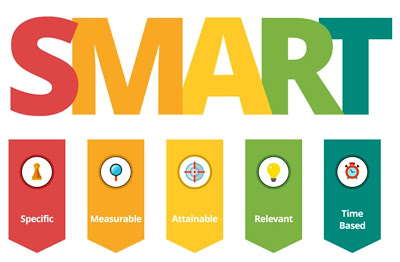Goal setting can be a powerful way of helping you to achieve what you want in life. Goals are about identifying something that you want, or want to improve, and then focusing on the steps needed to achieve them. Creating goals is a way to give yourself direction and motivation, and set yourself up for success.
The way you create your goals is very important – if you don’t set yourself the right kind of goals to begin with, you could possibly be limiting your success before you even get started. If you want your goals to be effective, you want to consider five elements when creating SMART goals:
1. S – pecific
Clearly define your goal. Effective goal setting involves more than just writing down a vague idea of what you want to achieve. It’s easier to plan out the steps you need to take to complete a goal and know when you’ve completed it if the goal is specific. Aim to clearly describe what you are trying to achieve. Think about who, what, when, where, why, and how of your desired outcome.
2. M – easurable
When you can track the progress of your goal, you know if you are getting closer to accomplishing them. Seeing yourself progress can help to motivate you to continue working towards the goal.
3. A – ttainable
All goals should be challenges; however, it even more important that they are also achievable. That doesn’t mean you can’t go ahead and set yourself some big goals. It just means that you need to break those big goals down into smaller, attainable goals that lead towards the bigger goal.
4. R – ealistic
You need to set goals that you can realistically do the work to achieve, considering your lifestyle, resources, current fitness level, and availability. They should be relevant to your life and appropriate for your health and lifestyle. Think about why you want to achieve your goal. Is it to feel stronger? Healthier? Meaningful goals help you stay more committed to working towards it. Be sure to set your goals high, but make sure they suit your lifestyle.
5. T – imely
Setting a start time and deadline for your goals is important. It allows you to work out a plan to achieve the goal by breaking it into daily actions and smaller milestones. When you set yourself a realistic time-frame, it’s easier to plan and schedule the time you’ll need to dedicate towards completing your goal. You’ll also more likely to be motivated to work towards a specific deadline because you know where the finish line is.
It’s important to keep track of your progress with any goal. There may be times where you have to revise your goals because of a setback or challenge yourself more because you reach your goals sooner than expected. Find a way to track your fitness so that you can see your progress and maintain motivation as you keep working towards your goal. Try using a fitness tracker to record workouts and set your daily movement goals. Another way you can track your progress is to log it into a journal along with noting what your action steps are to achieve your long-term goals.
As you plan your goals, write down your reasons for selecting that goal and the specific details of the goal itself. Once your know exactly what your new fitness goals are, you can make time for exercise and map out a plan to achieve it.
-Paulina Le
Health Fitness Specialist
